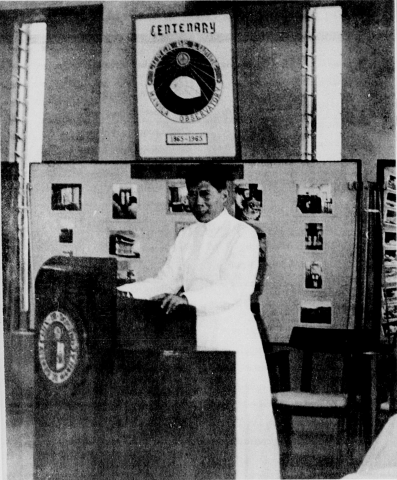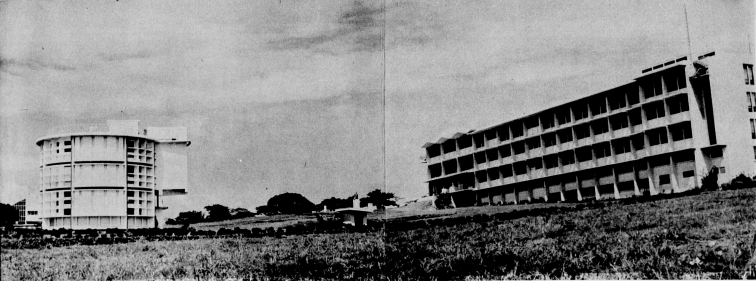(From Centenary Program of Manila Observatory, 20 September 1965)
I would like to call your attention to a curious fact. The first Jesuit Observatory to be founded anywhere in the world was founded in Asia. It was founded in, of all places, Peking, in the seventeenth century, and Father Verbiest, a Belgian Jesuit, was its Director. The formal organization of the Peking Observatory was preceded by the pioneering work of another Jesuit, the Italian Mateo Ricci. You will recall that Father Ricci gained access to China, in spite of the rigorous exclusion laws, and entry into the Forbidden Palace of the Emperor himself, because of his knowledge of mathematics and astronomy. It was really he who began the modern dialogue between China and the West, so stimulating and on the whole so mutually beneficial, by giving the Chinese their first introduction to Western Science and the world its first introduction to the remarkable insights of the Chinese philosophers.
Thus, when Father Colina started the Manila Observatory in an abandoned pigeon house in Intramuros one hundred years ago, he was continuing not only a venerable Asian tradition.
This fact–the fact that Jesuit missionaries were among the first to bring the science of the West to Asia–is not without significance. It is a concrete exemplification of the great truth that Western science is perfectly compatible with Asian thought, and that both find their deepest fulfillment in the Christian religion.
Ricci, Verbiest and their companions and successors in the Peking Observatory were, at one and the same time, dedicated priests and dedicated scientists. They saw nothing divisive in this double dedication; they did not, in fact, see it as a double but as a single dedication–to the truth, which is God. And being the priests and scientists they were, they did not disdain to learn from those whom they taught. They studied the Chinese classics; they spoke the Chinese language; they wore Chinese dress, they made their own the Chinese way of life. They saw no reason why the Chinese should stop being Chinese in order to become Christians or assimilate Western science. Rather the contrary. Christianity demands of the Chinese, as it demands of the European, that he be fully himself; that he be Christina in the Chinese manner. As as for science, the more they learned, the more they realized that science has no frontiers, neither national, nor racial, nor linguistic, nor ideological–it is as wide as the universe, as limitless as God Himself. The Peking Observatory is no more; but I believe that we can claim, with mingled humility and pride, that its spirit and traditions have passed to the Manila Observatory. Both its past and its present bear witness to this fact. Even a complete layman in science like myself, who finds it difficult to add fractions and cannot tell you the difference between an isotherm and an isotope, can at least appreciate what the Manila Observatory is, quite apart from what it does.
He can appreciate the fact that this is an institution in which science is used not to destroy but to save; in which research is inspired and guided by that noblest of Christian ideals, universal charity–the service of mankind, of all mankind, irrespective of color, race, or creed.
He can appreciate the fact that this is an institution in which men from many different lands and backgrounds have been able to collaborate constructively in a common devotion to the scientific ideal.
He can appreciate the fact that this has always been an unmistakably Filipino institution, attentive to the peculiar needs of this country, as well as to its special possibilities and advantages for scientific investigation.
He can appreciate the fact that this institution has never looked upon itself as a clerical or ecclesiastical monopoly; that it has always welcomed the assistance and collaboration of laymen; that it has managed to win and keep the loyalty of such men as Don Cesareo Jovellanos and Don Cesareo Duluena each of whom devoted fifty years of their lives to its work; and that today, even more than in the past, its doors stand open to, and its resources are placed at the disposal of, anyone capable and desirous of working with its Jesuit staff in exploring or advancing the frontiers of knowledge.
Finally, he can appreciate the fact that this institution is also a religious community; that its members, far from concealing or minimizing their religious commitment, make it the very center and focus of their lives; and that they have taken for their motto “Lumen de Lumine”–“light from Light”–because it is their faith, serene and imperturbable, that all the paths of knowledge, wherever they may wind, whether through the earth’s crust or the sun’s flames or the vast reaches of interstellar space, lead in the end to that Love that draws all men, all creation, to itself: that Love which Dante says that “it moves the sun, and moon, and all the stars.”


